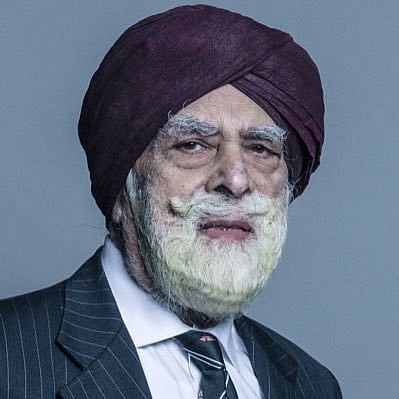Is UK’s ‘desi’ Islamophobia amping up, while white offenders run amok under the radar?
Rishi Sunak goes back to school, Gen Z prefers dictatorship, a prominent Sikh peer is involved in a grooming controversy and Einstein’s blackboard gets dusted off... in this edition of London Diary

Sikh peer provokes Muslim ire
A Sikh group, led by prominent Sikh peer Lord Indarjit Singh, has provoked a row by suggesting that Pakistani Muslim gangs involved in grooming and raping white girls were inspired by their faith, which regards non-Muslims as ‘kafir’.
It has called on the home secretary to extend an ongoing inquiry into the scandal to examine whether the perpetrators’ ethnicity and religion were “contributing factors in these terrible crimes”.
The Network of Sikh Organisations (NSO) UK has claimed that the “Sikh and Hindu community too” had been victims of such elements, citing a 2013 case in which a Sikh teenage girl was sexually abused in cars, parks and guest rooms across Leicester after meeting a group of Muslim men.
Lord Singh said the intention was not to tarnish the wider Muslim community and that he regularly raises issues about the (mis)treatment of Muslims.
But according to Muslim groups, the issue is being weaponised against their community. The Muslim Council of Britain has said that “despite persistent racist narratives, recent data… [shows] that perpetrators come from all backgrounds and that most group-based offenders are white”.

Rishi Sunak goes back to school
If the last refuge of retired Indian politicians is a governorship, for British political grandees it’s academia. Now Rishi Sunak joins a long line of retired (rejected?) prime ministers as he takes up teaching assignments — not one but two, and at Oxford and Stanford, no less. The former prime minister is to join Oxford’s Blavatnik School of Government as a member of its world leaders circle, besides taking up a visiting fellowship at Stanford’s Hoover Institution in California.
Sunak, who studied philosophy, politics and economics at Oxford before earning an MBA degree at Stanford, said he was “delighted” to be joining the two institutions — but for now, he doesn’t plan to give up his Parliament seat as a Tory MP.
He follows in the footsteps of Tony Blair, who taught a course at Yale University shortly after leaving Downing Street, and Gordon Brown, who became a ‘distinguished leader in residence’ at New York University.
Former foreign secretary William Hague has just become chancellor of Oxford University too. Hague said Sunak’s experience and “deep understanding of the challenges facing governments today” would be “a huge asset”.
“Rishi’s connection to Oxford University runs deep, and it’s great to see him coming back to his alma mater to contribute in such a meaningful way,” he said.
The Blavatnik School of Government teaches postgraduate courses in public policy while the Hoover Institution is a public policy think tank.
Condoleezza Rice, former US secretary of state and director of the Hoover Institution, said that his “extensive policy and global experience will enrich our fellowship and help to define important policies moving forward”.

‘Gen Z’ prefers dictatorship
The popular right-wing narrative tends to portray the so-called Gen Z as annoyingly ‘woke’ — shorthand for supporters of left–liberal causes.
According to a new study, however, most young Brits are anything but liberal — at least in their attitudes to democracy; they don’t want democracy and are all for turning Britain into a dictatorship.
Fifty-two per cent of Gen Z — people aged 13 to 27 — said they thought “the UK would be a better place if a strong leader was in charge who does not have to bother with parliament and elections”. Thirty-three per cent suggested the country would be better off “if the army was in charge”.
Forty-seven per cent agreed that “the entire way our society is organised must be radically changed through revolution” — compared with 33 per cent of 45- to 65-year-olds.

It also revealed the emergence of a stark gender divide among young people with 45 per cent male respondents saying “we have gone so far in promoting women’s equality that we are discriminating against men”. A similar proportion agreed that “when it comes to giving women equal rights, things have gone far enough”.
There’s also bad news for the media, with 58 per cent saying they considered social media posts to be more trustworthy than established journalism.
And, finally, a group of physicists have launched a campaign to urge the University of Nottingham to preserve Albert Einstein’s only signed blackboard in Britain and other surviving memorabilia.
In the early 1930s, Einstein made a series of trips to Britain, where he lectured at Oxford and Nottingham. The blackboard, scattered with equations from Einstein’s theory of space-time, currently hangs in the staffroom. The university is being urged to display more prominently this and other important items of his memorabilia.
Also Read: London Diary: Keir Starmer in the doghouse
Follow us on: Facebook, Twitter, Google News, Instagram
Join our official telegram channel (@nationalherald) and stay updated with the latest headlines
